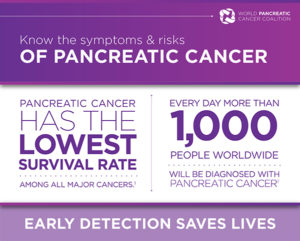According to the Surveillance, Epidemiology, and End Results (SEER) Program database, there will be an estimated 53,670 new pancreatic cancer cases this year in the U.S. While many patients still die from this disease, this proportion of patients has been stable for the last ten years, suggesting progress is being made in battling this challenging type of cancer.

MD Anderson Cancer Center at Cooper physicians Francis R. Spitz, MD, FACS and Umur M. Atabek, MD, FACS.
“Pancreatic cancer and cancers of the liver and bile ducts are complicated and difficult to manage,” says Frank Spitz, MD, Hepatobiliary Surgeon and Deputy Director of MD Anderson Cancer Center at Cooper. Treating these types of cancers requires the efforts of skilled and experienced surgeons working closely with a multidisciplinary team of cancer experts to deliver the best possible outcomes for each patient.
ERCP and Endoscopic Ultrasound are two specialized tests used to diagnose pancreatic cancer. These advanced tests are performed on an outpatient basis experienced gastroenterologists at Cooper’s Digestive Health Institute. With a more timely diagnosis, patients can begin treatment much earlier, resulting in the potential to dramatically improve outcomes.
At MD Anderson Cancer Center at Cooper, the pancreatic and hepatobiliary cancer surgical team is the most skilled and experienced in the region with demonstrated superior patient outcomes for the surgical resection of pancreatic, liver, bile duct and gallbladder cancers. To learn more about the Gastrointestinal Cancer Center, click here.

